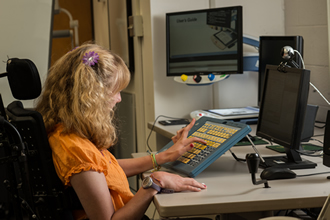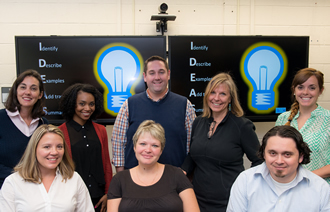Disabled get job training on Capitol Hill
Ryan Gutkowski, an intellectually disabled college student, seldom spoke when he first came to Capitol Hill. Now, he engages with staffers frequently — at times from behind the desk of his boss, Mississippi Republican Rep. Gregg Harper.
Gutkowski calls it "my desk."
Usually painfully shy, Gutkowski, whose disability is caused by a chromosomal genetic abnormality, cracks an easy smile anytime Harper addresses him. Staffers say the two seemed to have an instant connection.
"Tell them where you've been sitting when I'm not here — are you sitting at my desk?" Harper prods Gutkowski.
"Comfortable chair!" Gutkowski responds.
"Well, I love that chair, but I don't mind you using it when I'm not here," Harper says.
During the past month, Gutkowski and two other students with intellectual disabilities have worked in the offices of Harper, Reps. Bill Cassidy, John Fleming, Cynthia Lummis and Cathy McMorris Rodgers, as well as the Republican office of the House Administration Committee. The students do everything from answering constituent mail and shredding paper to learning how to give tours of the Capitol.
"I'm excited about having someone in the office who brings the real-world perspective of battling a disability and being able to have a lot to contribute," said McMorris Rodgers, whose young son, Cole, has Down syndrome.
The internships are part of a pilot program created by Harper, House Administration Committee Republicans and Mason LIFE, a post-secondary program at George Mason University for adults with intellectual disabilities.
The program doesn't guarantee the interns jobs on the Hill, but it does give them office experience in a high-profile workplace that is likely to boost their résumés when they begin searching for jobs.
Harper's 20-year-old son, Livingston, has a genetic condition called Fragile X syndrome, which is the most common cause of inherited intellectual disabilities. Since graduating from high school, Livingston has worked several days a week in a Mississippi restaurant and takes a few community college courses but still dreams of attending Mississippi State University in Harper's district, just like his sister.
The congressman is helping the university develop its own program for disabled students. In the process, he connected with Mason LIFE Director Heidi Graff and asked whether there was a way Congress could aid her students.
"After dealing with these issues for 20-plus years, that's kind of where our heart is," Harper told POLITICO. "A lot of times, when you get out of high school and you're dealing with intellectual disabilities, you fall off the educational face of the Earth. Sometimes you're looking to give hope to some of these families who want their child to continue on."
Barely six weeks old, the Hill program is rapidly generating interest among members, largely because the interns advertise themselves. Already, Senate and legislative branch offices are expressing interest.
by ERIKA LOVLEY | 4/28/10
from www.politico.com




